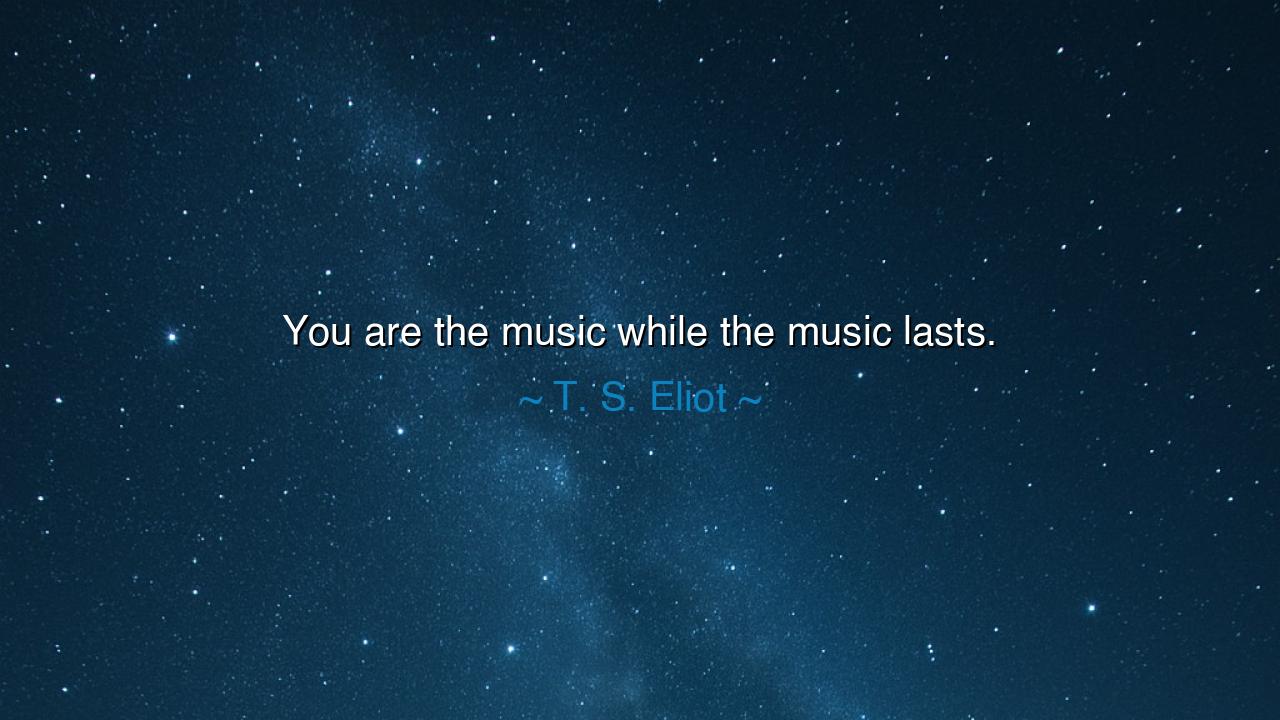
You are the music while the music lasts.






T. S. Eliot, poet of shadows and prophet of modern times, once wrote: “You are the music while the music lasts.” These words strike not only the ear but the very soul, for they remind us that in moments of beauty, in moments of transcendence, we do not merely observe life—we become it. Music is not something apart from us, like a painting on a distant wall. It enters us, flows through us, and for a fleeting instant, it makes us one with its rhythm, its harmony, its mystery.
To say “you are the music” is to declare that art and life are not separate. The listener is not a passive vessel, but an active participant in the song. When a melody stirs the heart, it is not merely sound striking the ear; it is life awakening within. The soul vibrates with the note, the body sways with the rhythm, and the mind lifts with the harmony. In that moment, you are no longer merely yourself—you are part of something vast, luminous, and ungraspable. And yet Eliot warns us with gentle melancholy: it lasts but a moment. The music lasts, and then it fades, leaving silence once again.
The origin of this wisdom lies in Eliot’s meditations on time, eternity, and the fleeting nature of experience. He saw life not as a steady possession, but as a series of moments—brief illuminations where the ordinary breaks open and eternity peers through. Just as a piece of music cannot be frozen in one note but must flow onward, so too is life a passing song. While the melody plays, you live fully; when it ends, you are left with memory and longing. Thus his words remind us of the fragility of beauty, and of the need to inhabit the present.
History gives us examples of this truth made flesh. Think of the young soldiers of World War I, weary from the trenches, who gathered around a single violin played in the mud of night. In that moment, though death surrounded them, the sound of the bow on strings lifted them from despair. They were not merely hearing the music—they were the music, their trembling souls woven into each note. When the song ended, reality returned, but for those few minutes, life itself was transfigured. Such is Eliot’s vision: that in fleeting instants, we become what we experience.
The ancients too recognized this mystery. The Greeks spoke of enthousiasmos—to be filled with the divine through song, dance, or poetry. In their festivals, men and women were carried beyond themselves, becoming one with the chorus, the drum, the lyre. They knew that music was not an object to be possessed, but an event to be entered. Eliot, centuries later, voices the same truth for a fractured world: you are the music while the music lasts, a participant in something greater than the self.
The lesson for us is both humbling and uplifting. Do not cling too tightly to moments of beauty, for they are fleeting, like the last fading note. Yet also, do not miss them—enter fully when they arrive. Whether in the laughter of friends, the tenderness of love, or the strains of a song at dusk, let yourself dissolve into the moment. Be present, and allow yourself to become the music, knowing that though it will pass, its memory will endure in you.
Practical steps follow: learn to silence distraction when life’s melody plays. When you listen to music, give it your whole heart. When you are with others, do not dwell on tomorrow—live as if the song is now. Embrace joy when it comes, even if it will fade, for its value lies not in its permanence, but in its power to awaken the soul. In this way, your days will not be empty measures, but living harmonies.
Thus Eliot’s words resound through time: “You are the music while the music lasts.” They call us to live with depth, to embrace the fleeting, and to become, even for a breath of time, one with the eternal. For though every song must end, he who has truly lived within it carries its echo forever in his heart.






AAdministratorAdministrator
Welcome, honored guests. Please leave a comment, we will respond soon